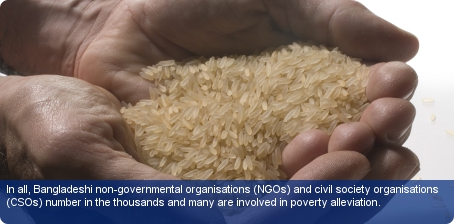Find Civil Society expertise in Bangladesh

Bangladesh’s non-governmental organisations (NGOs) and civil society organisations (CSOs) are predominant in Bangladeshi life, with thousands of organisations working to improve the country’s infrastructure and common problems. Standing alone, with minor legal restrictions, the limitations of this system will become less severe as the country continues to develop.
In all, Bangladeshi non-governmental organisations (NGOs) and civil society organisations (CSOs) number in the thousands and many are involved in poverty alleviation. One of the most prominent NGOs in poverty alleviation is the bank and Nobel Peace Prize Laureate, the Grameen Bank. The Bank was jointly awarded with its founder, Muhammad Yunus, the 2006 Nobel Peace Prize for its pioneering efforts in microfinance, which helped create economic and social development among the country’s poorest. The well-recognised efforts of Grameen are largely complemented by the Bangladesh Rural Advancement Committee (BRAC), which is the biggest NGO in the world employing almost 100,000 people. Since the 1970s, international NGOs such as Concern, Oxfam, Save the Children and Christian Aid, have been very active in assisting the general population in health, education and environmental matters.
No Bangladeshi law can ultimately define the operations of non-profit, non-governmental organisations. There are several laws which stipulate some of the features associated with such organisations such as the Societies Registration Act (1860); Social Welfare Registration Ordinance (1961); Mussalman Wakf Act (1923), which relates to the existence of Muslim philanthropic foundations and; Companies Act (1923) which allows for the formation of not for profit companies limited by guarantee. To avoid confusion and enhance the operations of NGOs and CSOs, the Government of Bangladesh established the NGO Affairs Bureau in 1990. The existence of the Bureau enables NGOs to obtain their registration clearance, approval and permission through a single agency.
Bangladesh has over 20 trade union centres which are situated in the urban areas meaning that the figures for trade-union involvement are low, hiding the participation of this minority urban population. Some trade unions are linked to political parties. As the country’s infrastructure develops, trade unions’ limitations will become less apparent.



